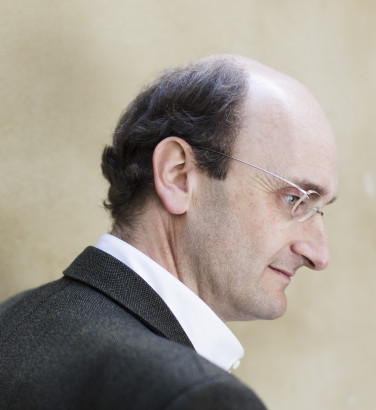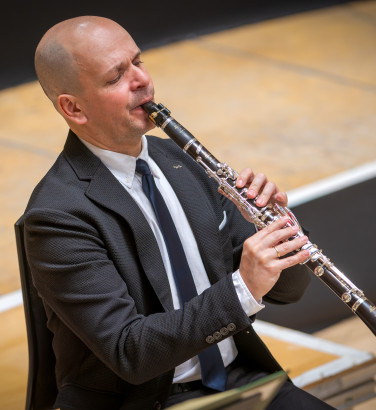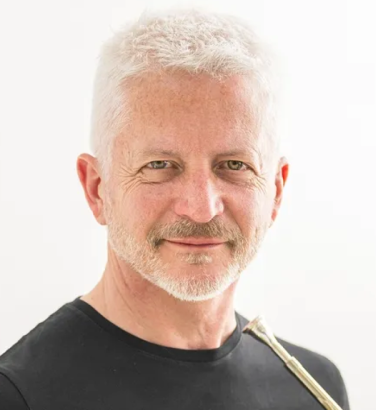
Ryan Bancroft: "a conversation with the leader of a Finnish orchestra changed how I heard Sibelius"
30 Sep 2024
News Story
Ryan Bancroft (photo credit: Per Morton)
The sight of conductor Ryan Bancroft dancing his way through Copland's Appalachian Spring was for many SCO audiences an early highlight of last Season. His return this autumn sees him explore the music of Scandinavia, a part of the repertoire with which he has become increasingly familiar through his work with the Royal Stockholm Philharmonic Orchestra, whose Principal Conductor he became in 2023.
Ahead of his concerts with the Orchestra - conducting the Grieg Piano Concerto (with fellow American Eric Lu), Tarrodi and Sibelius from 7 - 9 November - we are delighted that Ryan agreed to a short interview about the music from his homes old and new.
Welcome back to the SCO, Ryan! You’ve maintained quite a connection to Scotland since your days at the Royal Conservatoire of Scotland – what does it mean to you?
Scotland was my first big adventure. Having grown up in California and never thinking that I would ever leave the state to then uproot and live just opposite Kelvinhall station in Glasgow for 2 years was in many ways the most pivotal thing to have ever happened to me. When I left Scotland to pursue studies in the Netherlands, I genuinely felt that I left a part of myself behind. It means the world to come back to Scotland as often as I can.
After a programme built around American music [Appalachian Spring, in November 2023], you’re bringing us a concert of Scandinavian works this autumn. Has your experience of conducting Scandinavian orchestras changed the way you approach this repertoire?
Nordic music has always been incredibly life affirming to me, so to be able to perform a lot of this music up there is a huge privilege. Working there has also shown me how similar music making is but also the minutiae that differentiates interpretation there. An anecdote: I was conducting Sibelius’ 6th symphony in Finland a few years back. I arrived to the coda of the last movement (marked espressivo in the strings) and approached it passionately like any red blooded American would. I had the loveliest conversation with the leader of the first violins afterwards over a coffee and we had a fascinating conversation about how the Finnish people are a Lutheran people. Espressivo means something different to them, something more intimate. It changed how I heard the music.
Errolyn Wallen was keen to exploit your shared background in dance when you premiered her Dances for Orchestra with the SCO last Season. Are there any dance rhythms we should look out for in this year’s programme?
The most obvious dance aspect in the piece I would see is the third movement of the Grieg Piano Concerto, inspired by a Norwegian Halling dance. This is always rollicking and a joy to perform. Another aspect of dance to consider in the Sibelius is the use of cycles and repetition. Cycles and repetition is a cornerstone in most dance styles of the world, so this is always something that I think about when performing this work.
What would you programme to introduce your audiences in Stockholm to Scottish music?
Thankfully I don’t have to think too much about this question! We have already performed MacMillan’s Cello Concerto and The Confession of Isobel Gowdie and also are having a Composers’ week this Autumn focusing on his music as a retrospective. I am also looking forward to programming Sally Beamish’s music in the future (whom I met in a pub in Orkney once during the St. Magnus Festival though I don’t think she remembers!) as well as Sir Peter Maxwell Davies. One of my most cherished memories is performing Sir Peter’s Overture to St. Francis of Assisi in Kirkwall in front of him, so it’s a dream of mine to bring it to Stockholm. Also a fan of Hamish MacCunn!
Finally, is there any repertoire you long to explore with the SCO players?
Schumann, Haydn, and Gubaidulina. I fell in love with their Schumann when I was a student, truly fell in love with the composer Haydn when I saw them perform his symphonies as a focus one season, and Gubaidulina is a current obsession of mine. Let’s see where the wind blows!
Related Stories
![]()
Andrew Manze: "I've always loved Viennese waltzes and polkas"
1 December 2025
Our Principal Guest Conductor is really looking forward to conducting our Viennese New Year concerts!![]()
Maximiliano Martín: "A friend said 'Gnarly Buttons would suit you very well'"
10 November 2025
Ahead of his performance of John Adams' Gnarly Buttons, we spoke to our Principal Clarinet about performing as soloist with the Orchestra.![]()
Quickfire Questions with Kenneth Henderson
7 November 2025
Get to know our new Principal Horn!


